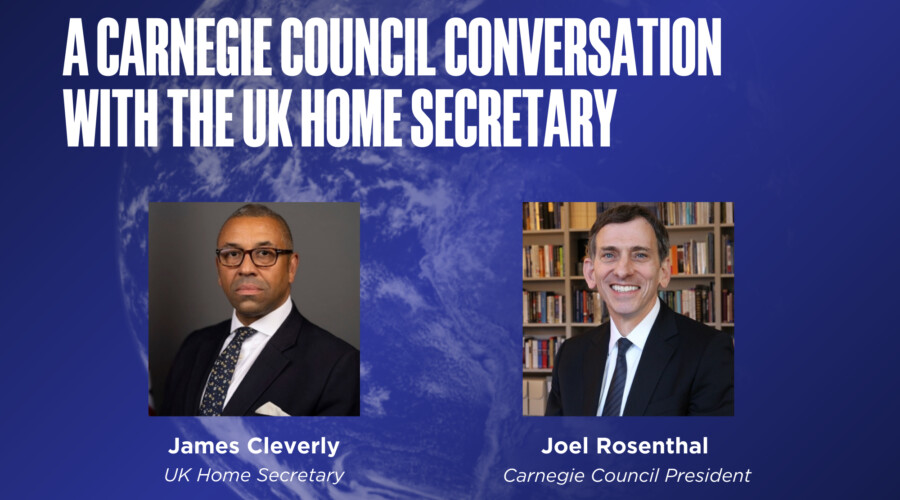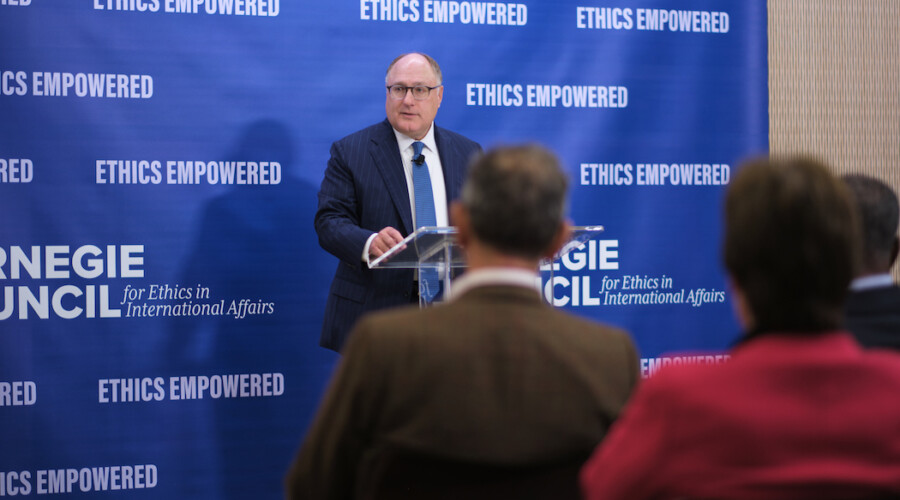Madueke Michael-Francis Nezie is in a postgraduate programme at the Strategic Business School, Agungi, Lekki, Lagos. "I was born in a rural community by the bank of the Niger River in Eastern Nigeria. I believe in God, in hard work, and in humanity. Though a graduate of Economics, I believe that humans are the most priceless of all assets and that humanity must prevail in our world more than anything else."
Essay Topic: In your opinion, what is the greatest ethical challenge or dilemma facing the planet?
Terrorism
Terrorism is the greatest challenge facing the world. The survival and continuation of man rest so much on peaceful coexistence, through dialogue, debate and promotion of values, rights and liberty. Terrorism in its various forms threatens the very coherence of our planet. It poses an international problem; therefore it is fair to say that its solutions must be also international. But confronting terrorism brings moral impasse in the process. What is the boundary of moral rights? Who is a terrorist? What is terrorism? It is a systematic and often unprecedented use of arms to destroy and kill massively, induce fear and intimidate. It is said that, "one man terrorist is another man’s freedom fighter," depending on whether one sympathizes with the course of the group in question. But terrorism, we all have come to understand, is much more of an act than a course. A good course, pursued with violence and massive killing is not justifiable. The presence of special interest creates the dilemma in reaching a legal consensus on terrorism. Everyone agrees there is terrorism but everyone does not agree on what is a terrorist act, when it is, and who is a terrorist. The reluctance in identifying and confronting terrorist acts and its perpetrators due to some special interests is dangerous, because what goes around comes around. Terrorism is an international problem.
The Nigeria terrorist situation is critical. I witness the untold harm it brings. Nigerians are living in an age of terror. Our freedom has been taken. The lives of our beloved families and friends go by the months. Expatriates and foreigners are also victims. It affects Nigeria's relation with the rest of the world. And we must do something about it. The history of terrorism in Nigeria might be longer than it seems if we look at history. In the late 1960s a civil war took place in Nigeria between the federal government and seceding South-eastern region. Insider views and reports show that the Nigerian fighting troops were not all patriotic military men fighting for the sovereignty of their nation. Actually during the war, an Islamic extremist group of northern Nigeria was unleashed on the seceding eastern region. The Fulani extremist group butchered non-combatants who they referred to as "infidels" or "Nyamili" in Fulani parlance. They, more preposterously, performed their acts in the name of Islam and Holy Allah. The world looked on and supported the so-called civil war.
Barely two score years after the civil war, a radical northern Islamist group (Boko-Haram) began to suicide-bomb and destroy everything it deemed Western and inherently "sinful"—government agencies, churches, the United Nations Embassy, foreigners, and even mosques that durst preach against their acts. The terrorists' "infidel" community has expanded. It was no more only Christian Igbos of the south. What goes around comes around. The heroes of Nigeria's civil war have turned against the government, the West, and everything else. It is imperative we began to learn from history. The Nigerian Boko-Haram exemplifies religious terrorism, perhaps with a political aim. The mire therein has caused a great deal of diplomatic confusion. The British Foreign Office and the International Criminal Court reportedly have described Boko-Haram as terrorists. The leader of the Supreme Council for Islamic Affairs, in June 2012, asked the United States government not to tag Boko-Haram as terrorists. The U.S. government described three leaders of the group as terrorists, but the BokoHaram terrorism as "sectarian violence," even as Homeland Security has urged the U.S. State Department to designate BokoHaram as a Foreign Terrorist Organization (FTO). In the Syria scenario, the United States has moved deftly to label a violent rebel group in Syria as terrorists, even though it fights an unpopular regime. Despite any political analyses, that was a good message to me and they must extend it to Nigeria.
There are many types of terrorism, some of which are not unanimously accepted, but religious terrorism proves to be the most dangerous of them. It goes beyond mere aggression or fight for political freedom. It is enshrined deep in the subjective moral conviction of the actors. This is dangerous. How do we fix terrorism? How do we confront terrorism without violating human rights? Dialogue has been proposed. But we know that "you do not have dialogue with terrorists." It is an unwholesome precedent to set. State governments in developing countries like Nigeria, Kenya, lack the advanced counter-terrorism tactics for military confrontation of terrorism. Therefore the state government alone does not provide a reasonable amount of security against terrorism. Silence presents no option, nonetheless. For the triumph of humanity against terrorism and restoration of peace, more international cooperation and collaboration is needed. Terrorism is like a virus. It cannot be said to be bound within certain political states or geographic boundaries.
In our 21st century, fighting terrorism is to me more like fighting an idea than like fighting wars. Many strategies and positions are coming up. For example, in 2006, the United Nations adopted a counterterrorist strategy. I am particularly drawn to the statement that although no condition justifies terrorism, there are conditions conducive to the spread of terrorism. Religious terrorism, I think, stems from some extreme religious convictions whose rationale is not very rationalize-able. But there are identified material factors that are conducive to terrorism, like rights abuse, poor governance, and socio-economic marginalization. When social and ethnic groups are mainstreamed into the social and economic system, the tendency for formulation of extreme ideological views is reduced or eradicated. To end terror, extremism and its attendant acts of terrorism must be addressed simultaneously. To fight an idea, we need an idea. The best way to eradicate terrorism is to never let it happen. It is a little like vaccination.
To fight conditions conducive to the spread of terrorism, we must encourage industry and business entrepreneurship, to build capacity, mainstream economic system and uplift the people of the society with social and corporate governance. We must also give values-based education to the youth. Massive compulsory education must be engineered to eradicate the case of absolute lack of education which results in misery and poverty, as found in many parts of the northern Nigeria. Teachers, civil society groups, non-governmental organizations, local government agencies, and corporations must be involved in this frontal attack. We must not sit back to leave it all to United Nations agencies. Only if we begin to unanimously take terrorism as world-threatening and untenable without playing it down with partisan politics, will humanity triumph in the war on terror.
In August 2010, a Malaysian businessman, Ali Hashim, said that "It is important for Muslims to be integrated into the economic mainstream. And the best way to achieve that is through business." He called for a "business jihad." He further explained that jihad should be wrestled from "religious extremist and those who pursue violence." He beautifully proposed that "selfless and positive Islamic values" substitute for "greed and avarice in extreme capitalism." Apart from "economic value it must enhance good [sic] through high ethical conduct and moral principles." I call it the two-pronged solution process. I choose to punctuate my stand with existing propositions, in order to show that we do not need "the philosopher’s stone." The solutions are among us; expressed in books, media, public opinions, and practical experiences. In northern Nigeria, for instance, there are craftsmen such as fabric makers, porters, dyers, and so on, many of whom are ironically poor. They are just not mainstreamed into governance. Some of the craftsmen would benefit from entrepreneurial training programmes. It will enhance their skills for productivity.
Enterprise initiatives should be taken to such zones where poverty sits unchallenged. It must be reconstructed to bear the necessary ethical and moral undertone and still send the all-important message of spurring and encouraging entrepreneurship. We cannot fight terrorist with wars alone. It might begin to look like fighting terror with terror and closing our eyes to the injustice going around us. We must restructure our learning process to engage students in debates and discussions to inculcate the culture of dialogue among them. They should not learn dialogue in books alone. They must learn to be involved. Terrorism must end for us to survive. It is killing us. Local security gives tips on avoiding being a victim. That is good, but not enough. It does not provide any solution. The coalition of North Atlantic Treaty Organization (NATO) against acts of terror is commendable. They can provide assistance to less developed nations in Africa who are in the unnatural throes of terror. They can stand for us when we flounder. They made us into countries. Our solidarity with the West must transcend transactional solidarity. It is only when we join hands for peace that we can say we are humanity and we are living together on our planet.



